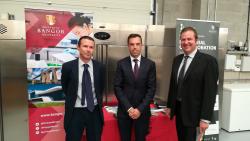Economy Secretary visits BioComposites Centre
The Welsh Government’s Economy and Transport Secretary, Ken Skates visited Bangor University’s BioComposites Centre recently to see examples of the centre’s collaborative research.
The BioComposites Centre undertakes projects to develop sustainable bio-based technologies that will minimise the impact of materials on the environment. The Centre collaborates with large multinationals, SMEs, micro companies and research institutes interested in lowering their Global Warming Potential (GWP). CabSec Ken Skates AM with Dr Adam Charlton and Dr Rob Elias at the BioComposites Centre, Mona
CabSec Ken Skates AM with Dr Adam Charlton and Dr Rob Elias at the BioComposites Centre, Mona
The Economy Secretary was welcomed to the facility at Mona Industrial Park by the Centre’s Director, Dr Rob Elias, and was briefed on the following collaborative projects:
BEACON is an EDRF-funded partnership between Aberystwyth, Bangor and Swansea Universities and has collaborated with Welsh SMEs on projects involving the conversion of biomass into a range of bio-based products, including, agrochemicals, biofuels, speciality polymers and new biomaterials for construction and packaging applications.
The Pro-Enrich project aims to develop novel functional proteins and bioactive ingredients from rapeseed, olive, tomato and citrus fruit side streams for applications in food, cosmetics, pet food and adhesives. The project consortium consists of 16 partners from 7 countries (UK, Denmark, Germany, France, Spain, Slovenia and Greece).
The SBRI project, jointly funded by Innovate UK and Welsh Government (Food and Drink Wales), aims to develop new functional food ingredients from surplus food industry resources in Wales and use them to replace high calorie ingredients such as fat, in the kinds of food that are particularly enjoyed by Welsh school children. The project is a collaboration between Pennotec Ltd, Cybercolloids Ltd, the BioComposites Centre and the Food Technology Centre (Grŵp Llandrillo Menai, Llangefni).
The Môn Naturals project is a collaboration between Môn Naturals Ltd and Bangor University, and is investigating the antimicrobial and antifungal properties of a natural remedy developed over generations on Ynys Môn, for the treatment of burns and a range of skin conditions. The company is developing this product under the Eliawen Cream brand and this will be launched in August 2018, initially as a cosmetics ingredient.
The SafeBioPack project is a collaboration between UK partners Tesco, Parkside, Nextek and SciTech Adhesives and Bangor University working with partners in Malaysia. The project is developing a range of bioplastic and pulp moulded packaging materials for use in meat and fresh produce.
The Economy Secretary said: “It was a pleasure to visit Bangor University’s BioComposites Centre and hear more about the innovative work underway to develop sustainable technologies that minimise the impact of a whole host of materials on the environment.
“The Centre is working in genuine partnership with a wide range of international partners - from multi-nationals through to micro companies and research institutes - on projects that will help to drive sustainable growth while reducing our collective carbon footprint. This absolutely reflects the aspirations of my Economic Action Plan and I look forward to hearing more about the results of this exciting work.”
This was echoed by BioComposites Centre Director, Dr Rob Elias, who said:
“It was a pleasure to welcome the Cabinet Secretary to our facility in Mona. The visit gave us the chance to showcase some of our collaborative industrial research projects involving local companies that will lead to real innovations and commercial opportunities. Having the facilities and expertise such as we have here in Mona is important for the University and for the region and I am very proud of the achievements made by our research teams.”
Publication date: 1 August 2018
